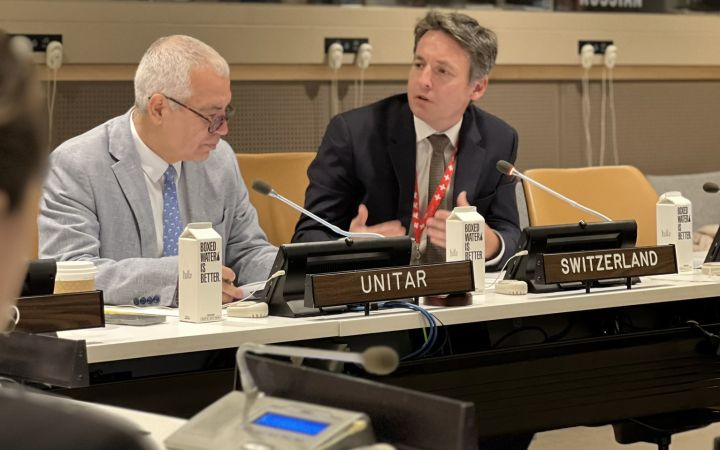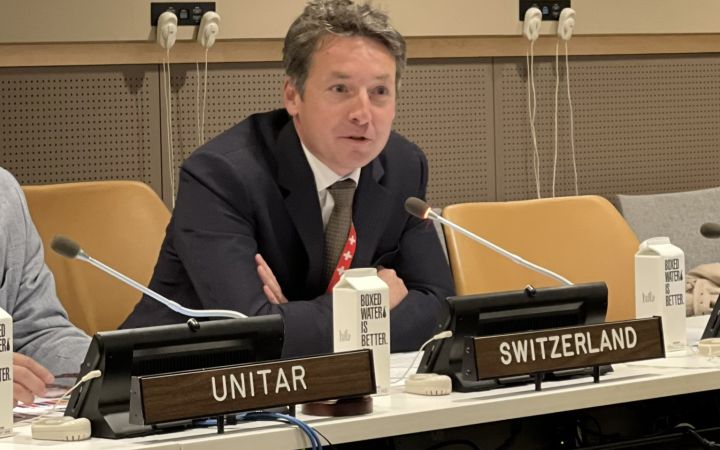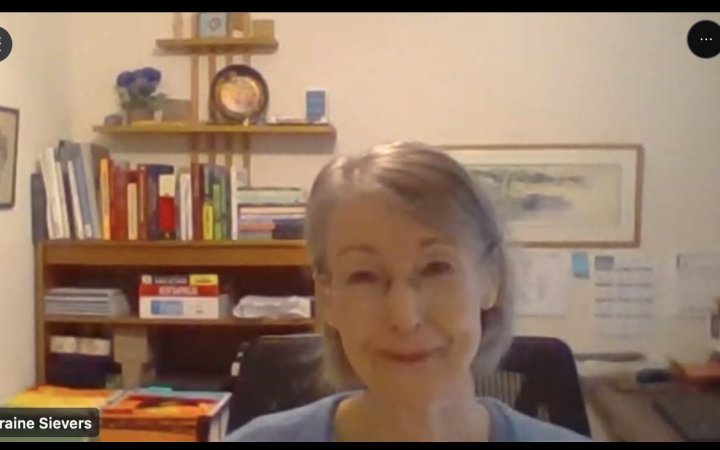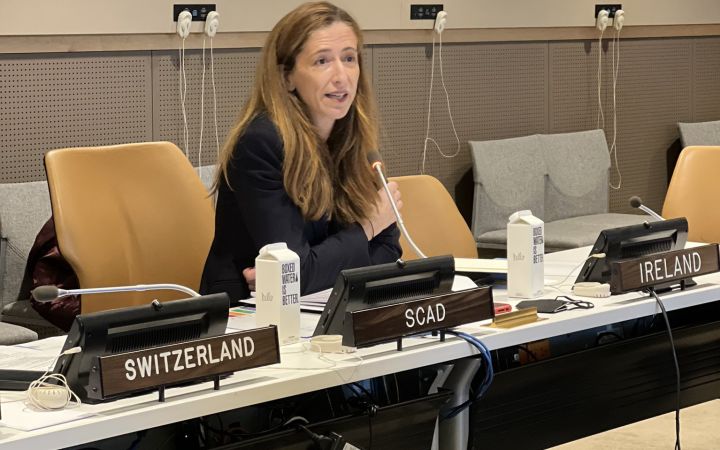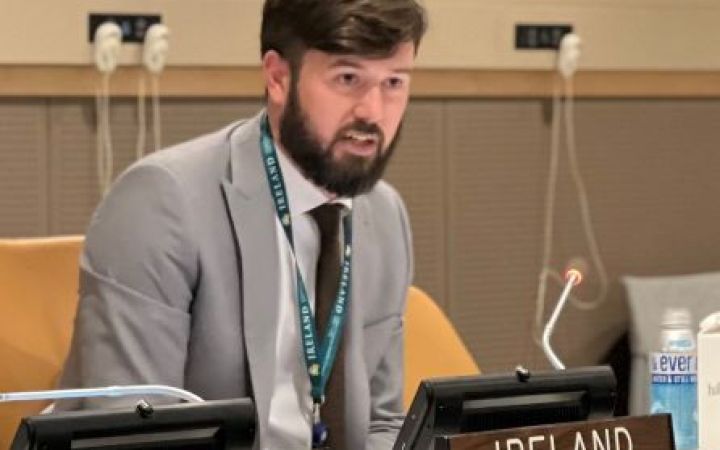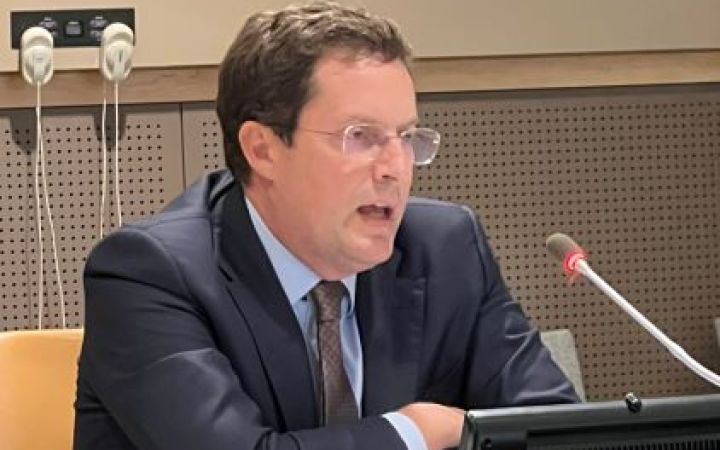14 October 2022, New York, USA - The United Nations Institute for Training and Research (UNITAR) New York Office held a closed Security Council Training session for the Permanent Mission of Switzerland to the United Nations, in preparation for the country’s participation as a non-permanent member of the United Nations Security Council. The training was held at the United Nations Headquarters -- and was a private, closed session with the programme tailor-made by UNITAR specifically for Switzerland.
The training opened with Mr. Marco A. Suazo, UNITAR Head of New York Office, giving welcoming remarks to the participants. Mr. Suazo noted how ecstatic he is to see numerous people of the younger generation, especially young women, present in the room. He notes how refreshing it is to see how interested the younger generation is in pursuing careers within the United Nations. The importance of the Security Council was emphasized by Mr. Suazo, stating that its role is important now more than ever, and Switzerland’s role as a non-permanent member will greatly contribute to it. Mr. Suazo closed his remarks by stating that UNITAR has prepared a special programme for them and that there are panelists for the participants who have had significant experience working for and with the Security Council to share their knowledge and expertise in the field.
H.E. Mr. Adrian Hauri, Deputy Permanent Representative of Switzerland to the United Nations, gave his opening remarks, welcoming his colleagues to what he expects to be a significantly fruitful and helpful session for the Swiss delegates. Ambassador Hauri notes that in 2021, he and Mr. Suazo had a meeting to discuss future collaborations between UNITAR and the Switzerland Mission, stating how happy he was that the planned collaboration has come into fruition – with the Joint Swiss-UNITAR Briefing on Budgetary Matters held in September, and now, the Security Council Training. Ambassador Hauri mentions how excited he was to learn about the Security Council from experts handpicked by UNITAR and said that he has not had many opportunities to take classes or sessions like the one organized by UNITAR. Finally, Ambassador Hauri encouraged the Swiss delegates to keep being hungry for knowledge like he was for the day’s session and to take advantage of such a rare opportunity to learn about the Security Council from highly regarded experts.
Ms. Loraine Sievers, former Chief of the UN Security Council Secretariat Branch and co-author of The Procedure of the UN Security Council, was the main speaker of the event, leading 4 out of the 7 segments prepared for the day. For the first segment, Ms. Sievers spoke about Agenda Item Formulation (Important role of agenda item formulation, agenda for each meeting (Rule 9), Summary Statement as the Council’s “Agenda”, and case studies), and the second segment was about Conduct of Meetings (Constructing the monthly programme of work, how formal and informal meetings are initiated, types of formal public meetings and related issues, types of formal private meetings and related issues).
For her third segment, Ms. Sievers discussed Preparing and Conducting the Presidency (Presidency expenses, preparing the monthly programme of work and special considerations for month of May, programme of work approval process, the President’s role in conducting formal and informal meetings, adjusting the programme of work as the month progresses, managing the documentation flow, decisions in the format of letters by the President, relations with the wider UN membership, regional organizations and civil society, and translation and interpretation).
Ms. Blanca Montejo (Senior Political Officer and Deputy Chief, Security Council Practices and Charter Research Branch, Security Council Affairs Division, Department of Political and Peacebuilding Affairs) was also invited to speak on the Current Working Methods and Issues Before the Security Council, which consisted of the topics regarding 1) The Informal Working Group on Documentation and Other Procedural Questions; 2) Implementation of the note by the President of 30 August 2017 (S/2017/507) and subsequent notes; 3) Rethinking penholdership, 4) Access to documentation of the Security Council by elected members; 5) Participation of rule 37 invitees: the situation after COVID-19; 6) Participation of rule 39 invitees, particularly civil society participants; 7) Reacting to requests for meetings by the broader membership: Article 35 of the Charter and the interaction between rules 2 and 3 of the provisional rules of procedure; 8) Searching for the right informal setting; 9) the case for Arria-formula meetings; 10) The interaction between the annual report and monthly assessments; and 11) WPS and the working methods of the Security Council.
Mr. Eoghan McSwiney, (Alternate Political Coordinator and Spokesperson at the Irish Mission to the United Nations) was invited to speak about the experience of Ireland as an elected member of the Security Council. The topics Mr. McSwiney discussed include the challenges of initiating a new agenda item and maintaining momentum, penholding and co-penholding, planning and conducting signature events, relations with the press, and E-10 coordination.
Finally, Mr. Marco Bianchini (Chief of Office, Office of the Under-Secretary-General for Peace Operations) gave a short briefing on the Security Council and its administrative side. The event concluded with Ms. Sievers wrapping up the whole session and opening the floor for Q&A. The participants asked many questions and were extremely interested to learn more about the Security Council -- the event was successfully completed with a hope of UNITAR and the Switzerland Mission looking forward to future collaborations.


